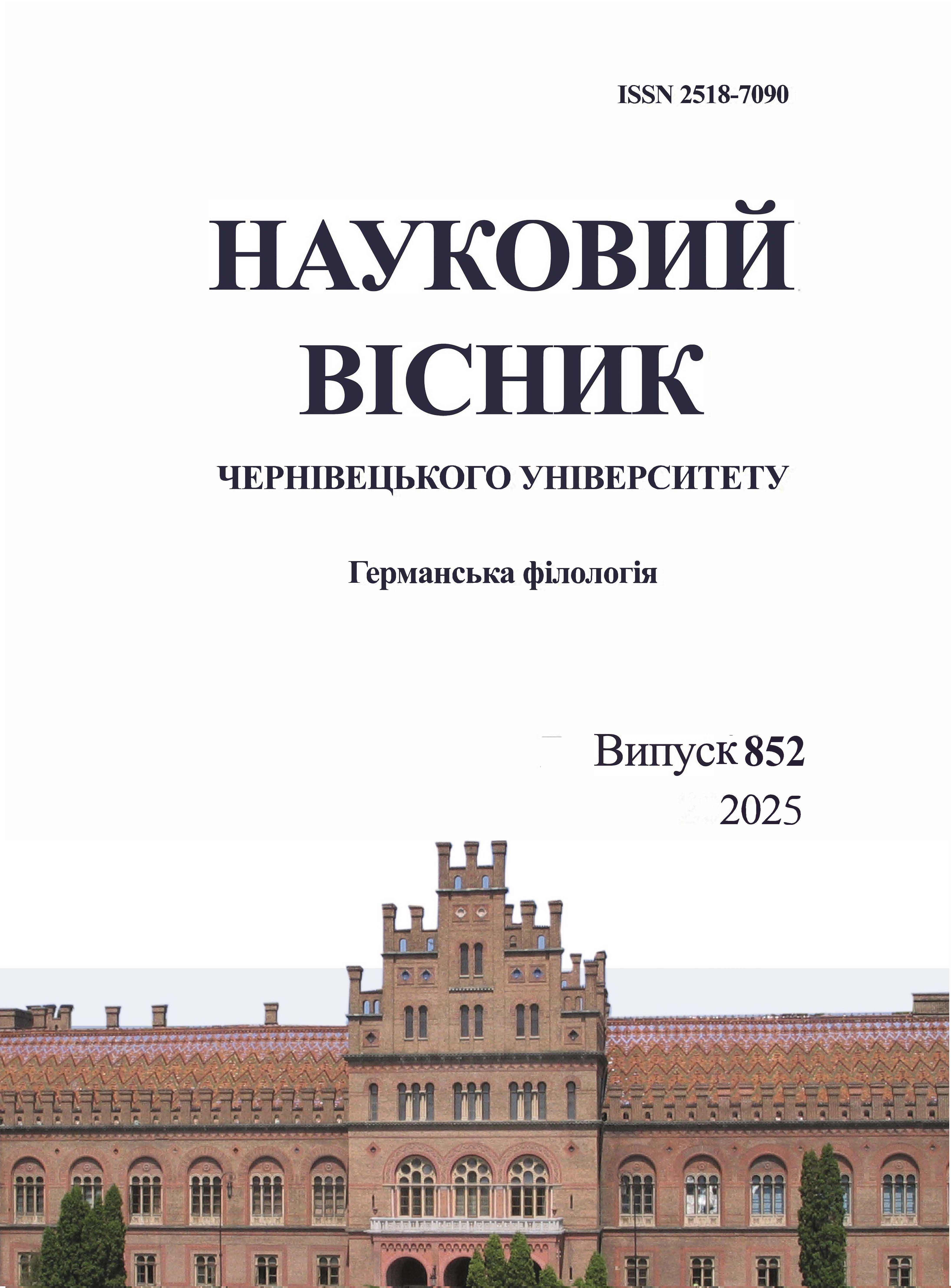DIE VERKÖRPERUNG DER IDENTITÄT VON ROSE AUSLÄNDER IN DEN POETISCHEN NATURBILDERN
DOI:
https://doi.org/10.31861/gph2025.852.78-86Keywords:
Rose Ausländer, poetic identity, image, motif, the lyrical «self»Abstract
The publication is devoted to the poetics of the works of Rose Ausländer, a German-language poet from Bukovina. The aim of the study is to identify and analyze the specific features of the construction of Ausländer’s poetic identity through the imagery of animate and inanimate nature, both in the context of the evolution of her poetic oeuvre and on the micro-level of individual texts. One of the main objectives is to determine the distinctive characteristics of different creative periods and to highlight the central aspects of the analyzed poems. The research employs biographical, comparative-historical, and hermeneutic methods, as well as elements of intertextual theory and the literary technique of close reading.
The article examines the images of animate and inanimate nature, through which the poet reinterprets and shapes her lyrical self in the search for personal identity. Particular attention is paid to the language of birds, which, according to the poet, articulate poetry and become metaphorical counterparts to the poet. The lyrical “I” is closely identified with both the figure of the poet and the bird.
Floral motifs, especially the image of the rose, play a crucial role in the construction of poetic identity. The symbolism of the rose in Ausländer’s poetry is rich in meaning and acquires new connotations depending on the context. This metaphor, like several others, formed the foundation of her early work and remained central throughout her creative development. Thus, the analysis of natural imagery in Rose Ausländer’s poetry confirms that it constitutes an essential component in the formation of her poetic identity.
Downloads
References
LITERATUR
Ausländer R. Denn wo ist Heimat?: Gedichte. Frankfurt a. M.: S. Fischer Verlag, 2000. 143 S.
Ausländer R. Die Musik ist zerbrochen: Gedichte. Frankfurt a. M.: S. Fischer Verlag, 2002. 241 S.
Ausländer R. Die Nacht hat zahllose Augen: Prosa. Frankfurt a. M. : Fischer Taschenbuch Verlag, 2001. 187 S.
Ausländer R. Die Sonne fällt: Gedichte. Frankfurt a. M.: Fischer Taschenbuch Verlag, 2001. 177 S.
Ausländer R. Gelassen atmet der Tag: Gedichte. Frankfurt a. M.: S. Fischer Verlag, 2002. 243 S.
Ausländer R. Hinter allen Worten: Gedichte. Frankfurt a. M.: Fischer Taschenbuch Verlag, 2002. 211 S.
Ausländer R. Sanduhrschrift: Gedichte. Frankfurt a. M.: S. Fischer Verlag, 2001. 181 S
Ausländer R. Wir pflanzen Zedern: Gedichte. Frankfurt a. M.: Fischer Taschenbuch Verlag, 2000. 211 S.
Ausländer R. Wir ziehen mit den dunklen Flüssen: Gedichte. Frankfurt a. M.: Fischer Taschenbuch Verlag, 2008. 197 S.
Kłańska M. «Ich Überlebende des Grauens schreibe aus Worten Leben». Zur Problematik von Sprechen und Schweigen bei Rose Ausländer. «...wortlos der Sprache mächtig». Schweigen und Sprechen in der Literatur und sprachlicher Kommunikation / Hrgb. H. Eggert, J. Golec. Stuttgart-Weimar: Verlag J.B.Metzler, 1999. S. 133–158.
Köhl G. Die Bedeutung der Sprache in der Lyrik Rose Ausländers. Pfaffenweiler: Centaurus Verlag, 1993. 376 S.
Rychlo P. Zum Problem der Synthese der Bukowiner Multikultur. «Czernowitz bei Sadagora». Identitäten und kulturelles Gedächtnis im mitteleuropäuschen Raum. Jassyer Beiträge zur Germanistik X / Hrsg. A. Corbea-Hoişie, A. Rubel. Konstanz: Hartung-Gorre Verlag, 2006. S. 183–192.
Werner K. Vorwort. Werner K. Fäden ins Nichts gespannt. Deutschsprachige Dichtung aus der Bukowina. Frankfurt a. M.: Insel Verlag, 1991. S. 7–19.






